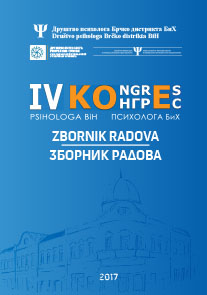Povezanost doživljaja opterećenja u školi sa psihosocijalnim faktorima kod mlađih adolescenata
Relation between Experience of School Overload and Psychosocial Factors in Early Adolescents
Author(s): Amela Dautbegović, Sibela Zvizdić Meco, Mirna Marković PavlovićSubject(s): School education, Educational Psychology, Social psychology and group interaction, Family and social welfare
Published by: Logotip
Keywords: student’s school overloads; psychosocial factors; early adolescents;
Summary/Abstract: The research was conducted in order to examine the relation between effective experience of school overload and predictors from the family, school and peer context (parents’ level of education, number of children per family, parental supervision, perceived social support from family, peers and teachers, dimensions of intimate/close friendship: knowing and sharing and trust and loyalty, dissatisfaction with school/aversion to school). We tried to examine if there was connection between effective experience of school overload and certain psychological states (level of depression, psychosomatic reaction, general anxiety and anxiety in test situations). In order to better understand the relation between school overload, environmental factors and psychological conditions, we analysed answers of early adolescents at certain items of the School Overload Scale. The research involved seventh and eighth grade students from six primary schools of Sarajevo Canton (N=400). Instruments: School Overload Scale, Parental Control Scale, Modified Social Support Appraisals Scale, Intimate Friendship Scale (knowing and sharing; trust and loyalty), Children’s Anxiety Scale, The Birleson Depression Self-Rating Scale, Questionnaire of Psychosomatic Reactions. Students, whose mothers had higher level of education, as well as students who achieved higher results on subscale of friendship intimacy (knowing and sharing), had experienced higher level of school overload. Statistically significant association was observed between school overload and dissatisfaction with school (r=.59; p<.01), teacher support (r=-.35; p<.01), family support (r=-.22; p<.01) and parental supervision (r=-.16; p<.01). Father’s level of education, peers support and friendship intimacy (trust and loyalty) were not statistically significant associated with student’s experience of school overload. Students who had experienced higher level of school overload, reported on the presence of higher level of depression symptoms, psychosomatic reaction and general and test anxiety. Having in mind the results, it is necessary to consider the practical implications concerning the possibilities of planning and implementing activities aimed to prevent difficulties that early adolescent are facing, primary in the school context, precisely through numerous school overloads.
Journal: Zbornik radova Kongresa psihologa Bosne i Hercegovine
- Issue Year: 2017
- Issue No: 4
- Page Range: 43-61
- Page Count: 19
- Language: Bosnian

